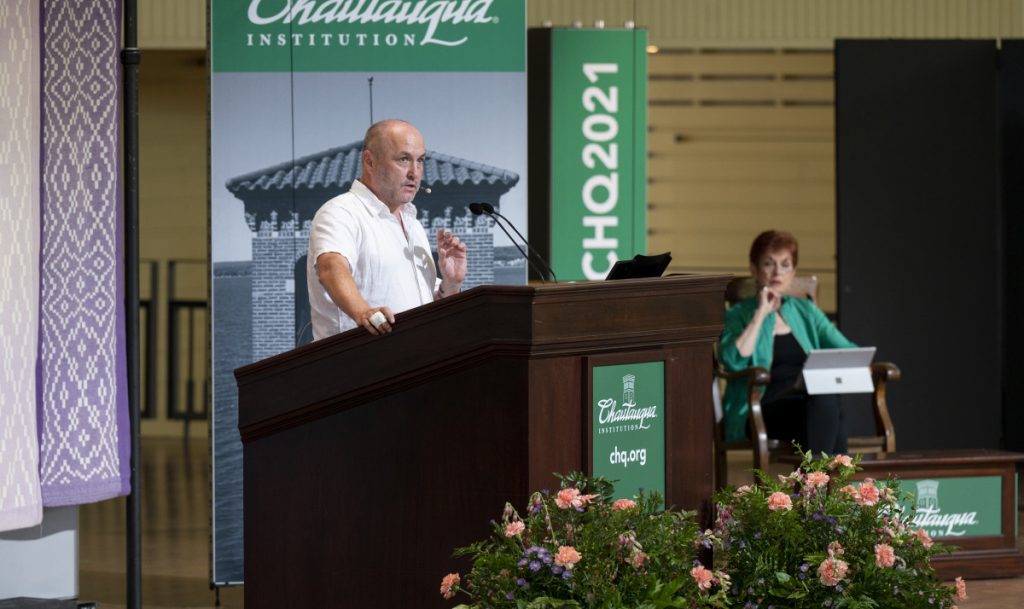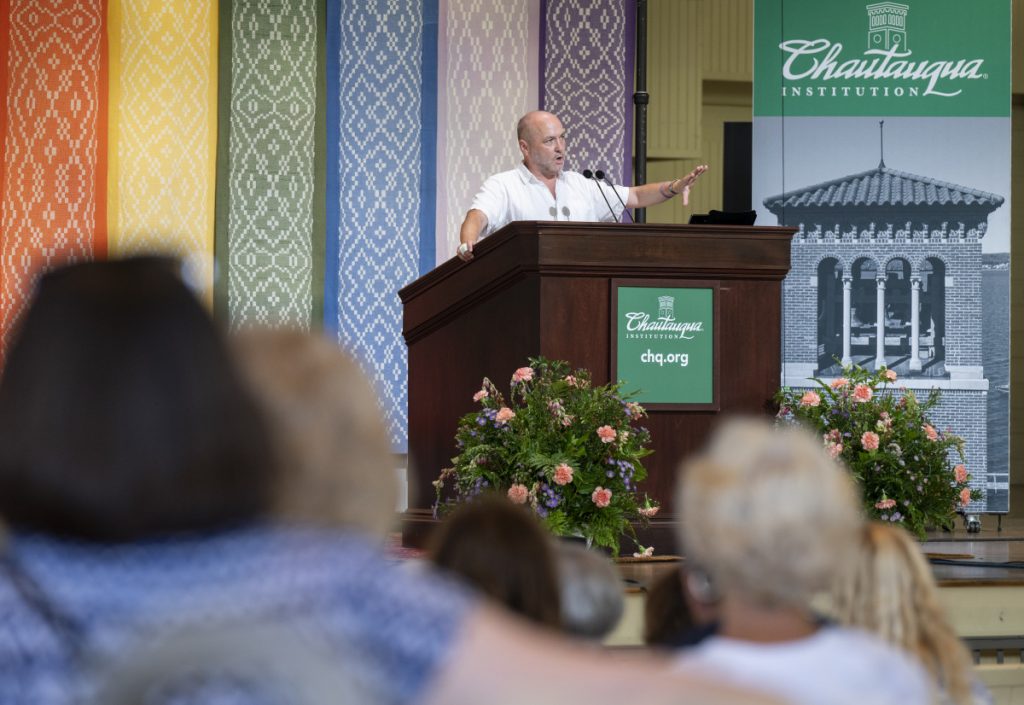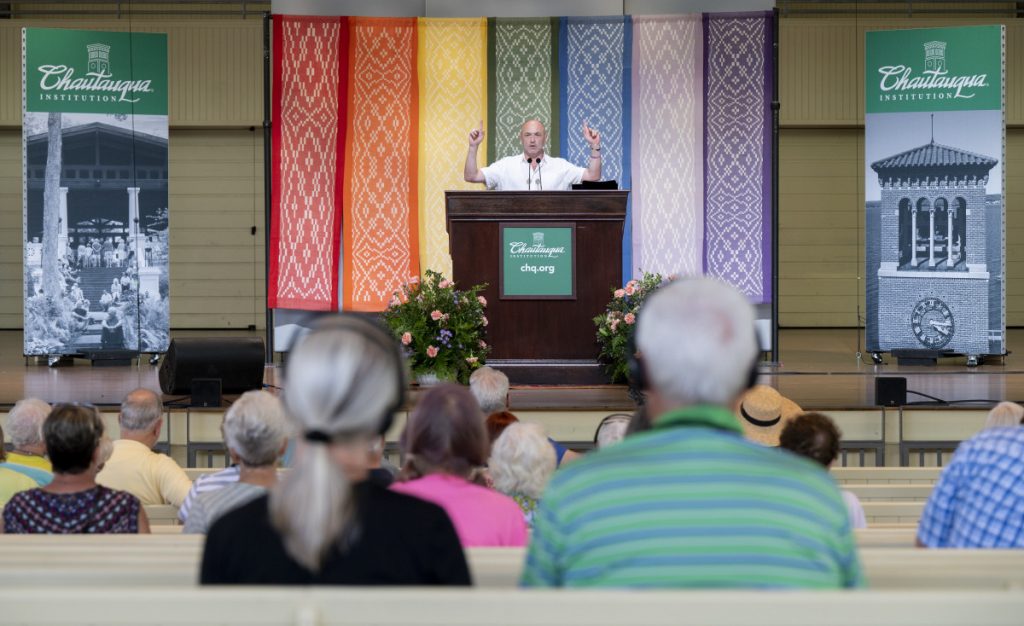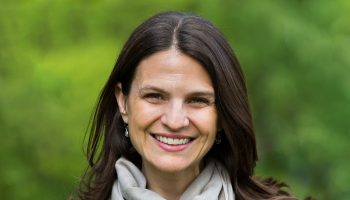MAX ZAMBRANO – STAFF WRITER

Albert Einstein wrote Sigmund Freud a letter in the summer of 1932 regarding humans’ lust for hatred.
“Do you think it would be possible to guide the psychological development of man so it can become resistant to the psychosis of hate and destruction, thereby delivering civilization from the menace of war?” he wrote.
Colum McCann, reading the letter to his Amphitheater crowd, responded with, “Gulp.”
At this moment in time, both Einstein and Freud felt they had a moral responsibility to speak out about the impending doom of the world, said McCann, a National Book Award-winning fiction author.
Freud responded with an admission that people didn’t really like the things he told them, and he didn’t think it was possible for humanity to rid itself of aggressive tendencies, McCann said.
Freud did have an idea, though.
“The desire to end war is not impossible,” Freud wrote. “Anything that creates emotional ties between human beings will inevitably counteract war. What should be sought should be a community of feeling and a methodology of the instincts.”
So began McCann’s Interfaith Lecture 1 p.m. Aug. 24 in the Amp. The lecture, titled “Resilience: The Life You Find in Your Stories,” the second of three Interfaith Lectures themed “Resilience.”
McCann is a cofounder of Narrative 4, which he described as a global nonprofit that uses storytelling to create empathy and compassion among young people around the world. He believes stories and storytelling is one thing that, as Freud said, can create a community of feeling.

In one example, Narrative 4 gathered high school students from two seemingly complete different worlds.
One high school represented the south Bronx. McCann said it was one of the poorest congressional districts in the country. They met with students in eastern Kentucky, near Hazard in Floyd County.
“In the Bronx, you have a school that’s mostly Black and/or immigrant,” he said. “It’s mostly blue. It’s almost exclusively urban. In Kentucky, you have mostly white and/or Cherokee, mostly considered to be red and definitely mostly rural. These young people seem to us sometimes, and certainly to themselves at first, to be very distant from one another. In fact, they were often scared to be seen together and to meet one another.”
All the students met in rural Appalachia — the hollers, as kids from the Bronx would learn to say. Once they began sharing stories with each other, they realized they weren’t so entirely different.
“The fear faded, their imaginations expanded, and they began to see the world in an altogether different way,” McCann said.
One pair of students was a young woman who wore a hijab from the Bronx and a young man who owned a pickup truck, carrying in the back a rifle and a Confederate flag flying in the wind. The two looked at each other, unsure of how to ever understand one another, McCann said.
Then, they begin to talk. The woman, under her hijab, had AirPods and was listening to the same music the man liked. She then learned that he carries a rifle because his family is poor, so he occasionally hunted rabbits — she didn’t realize that white people could be poor.
“Suddenly, all these things start coming together,” McCann said.
The groups talked about the opioid crisis, the suicide epidemic and discovered love, relationships, family, hatred, violence, sacrifice and more, he said. They did not, McCann emphasized, talk about facts, figures or political parties.
“The exchange highlighted what stories can possibly do,” he said. “The world gets nuanced with stories. It gets complicated. It gets muddied — beautifully muddied. Sometimes even incomprehensible. And sometimes, that incomprehensibility becomes part of the joy.”
Narrative 4 pushed the students to turn their newfound empathy into action. McCann said the organization believes stories aren’t enough if no action is taken afterward.
Looking back at the time of Einstein and Freud, when both men lived in exile from Nazi-controlled Germany, McCann said it’s sometimes easy to think the world hasn’t changed at all.
He pointed to wars and humanitarian crises around the world, from Afghanistan to North Korea, from Sudan to Catalonia, from Syria to Pakistan.
“With this reality of constant war, constant dislocation and this moral homelessness that we seem to have allowed ourselves to be sunken into, we have to ask: Can story have any effect at all?” he said.
In a world that is in flux, full of rapid evolutions, people like to think they are listening to each other, McCann said. He questioned if people really were, though.
“So much of the time it seems — not in (Chautauqua) — but maybe if you go home, so much of the time it seems we’re coming indoors,” he said. “We’re closing curtains, locking down the GPS systems in our imagination.”
Stories increasingly sound like whining, or have borders, he said. People feel they need to win an argument and be correct, he said, especially in the last couple years because of politics.
“Our empathetic possibility is being walled off,” he said. “We’ve become so atomized and so small that our lack of affection for others is sometimes astounding.”
Cynical people, he said, believe the world is a dark and dreary place, but others can show understanding to that perspective, but present something new.
McCann humbly argued that Einstein might have missed the notion that storytelling would be the change he proposed nearly 90 years ago.
To explain, McCann brought in a little bit of science with the principle of emergence. This principle essentially means that a multitude of any living beings are stronger together than one single living being. For example, he said one bird is beautiful, six work great together, but 600,000 birds flocking over South America have extraordinary intelligence.
When discussing the principle of emergence and emergent storytelling, he means building stories from the ground up.
“So, not only the story of you, but the other person, too,” he said. “I’m not talking about ‘other’ in a vague ‘otherizing’ sense which can get you in trouble at universities, rightly, these days. The other can be your husband, wife, person across town, person across continents, indeed. Keep that in mind when talking about telling your story, but telling the story of someone else.”
He also said that groups of people can possess either great intelligence or stupidity and violence.
Stories upon stories can exhibit the principle of emergence, he said.
“In this fractious day and age, the sharing of our stories might be the only thing within our resilience that can manage to save us,” he said.
When people do begin this process, they must listen and engage with those they don’t even know or like, he said.
“It begins in our own backyards and then spreads outwards,” he said. “Even the wounded bird that doesn’t get to the front of the queue gets carried along.”

Students from the Bronx and Kentucky shared this experience by retelling each other’s stories, he said. A student from the Bronx would become a student from Kentucky, and vice versa.
“We didn’t demand from these young people that their stories would win any argument,” he said. “We didn’t demand that they would be didactic. We didn’t demand they would say the South did this or the north did this or slavery caused that. They didn’t want to talk about that. They wanted to talk about personal things. From that, the change rose from the ground up.”
When a principal from the Bronx died of COVID-19 last summer, the Kentucky students feared it was the one they met. It wasn’t, but they still wrote a letter to the impacted school.
McCann reported that the Kentucky teacher said this program transformed the school, and the Bronx principal said there were higher levels of attendance and graduation and lower level of conflict in her school.
Resilience is found in our lives and rediscovered in other people’s stories, he said. It’s rediscovered a third time in recounting others’ stories and quadruply in listening to the stories of others.
“Stories are the ultimate act of resilience,” he said. “Resilience means to be able to withstand and/or to recover quickly. Resilience means to say I have existed, and I still exist.”
People do not need to be reduced to simplicity as political parties and the media do, he said. Instead, he said people need messy engagement.
“We need to go to the furthest point we thought we could go, and then take five steps eastward, then take another 10 steps westward, redward, blueward,” he said.
Doing so can save democracy, the United States, and the world, he said.
He then turned to his recent book, Apeirogon, and the book’s main characters, based on real people: Rami Elhanan, an Israeli, Jew and graphic artist, and Bassam Aramin, a Palestinian, Muslim, former prisoner and activist.
Both men lost a daughter due to the Israel/Palestine conflict, and both found connection through that loss. McCann was touched by their story. The book’s title means a shape with a countably infinite number of sides.
“You can be a part of the shape; exist in the finite and also exist in the infinite,” he said. “We all matter.”
Apeirogon is divided into 1,001 fragments, a nod to One Thousand and One Nights, a collection of Middle Eastern folk tales, he said. He closed his lecture reading from the 1,001st in his book.
In it, he describes the two men going to meet each other and people from all over the world going to listen on a chilly, foggy day in late October.
“(They were going) to listen to the stories of Bassam and Rami and to find, within their stories, another story, a song of songs, discovering themselves,” he read. “You and me in the stone tiled chapel where we sit for hours, eager, hopeless, buoyed, confused, cynical, complicit, silent, our memories imploding, our synapses skipping in the gathering dark, remembering while listening to all of those stories that are yet to be told.”




